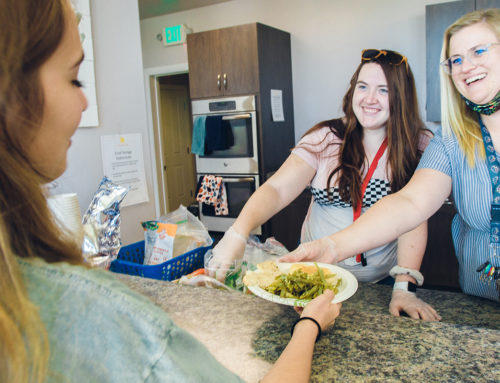What is just as important as emotional health at Sunrise RTC? Physical wellbeing, definitely!
Physical health and mental health are closely interconnected, with each influencing the other. Regular exercise and a healthy diet have been shown to have a positive impact on mental health by reducing symptoms of anxiety and depression. Additionally, taking care of one’s physical health can increase self-esteem and confidence, which can improve overall mental wellbeing.
Here are some ways we focus on physical well-being at Sunrise Residential Treatment Center:
- Exercise:
There are plenty of opportunities for exercise at Sunrise! One of the more formal offerings is for physical education credits. Here’s what our PE teacher, Nicole Andra, has to say about it!
“I have found that one of the best ways to foster physical health amongst our students is to get them involved in a physical activity that they enjoy doing.
Getting students to engage in physical activity, at Sunrise, involves providing a feeling of safety, activity that peaks their interest, a relationship, and DBT skills.
We are working with a population who are highly sensitive about their image and being judged by their peers. Providing a positive environment that fosters support and encouragement, with zero tolerance for bullying, mocking, or belittling, allows our students to be more vulnerable in what could be a naturally uncomfortable setting.
A great way to promote engagement in physical activity among our students is to get them involved in a physical activity that they enjoy doing. At Sunrise, we offer 2-3 activities available to participate in for PE and allow the students to sign up each day for whatever one they want to participate in. This gives them some ownership over their health and promotes more engagement from our students.
As themed throughout our program at Sunrise, we foster change through relationships. This carries over into every department, including academics and PE! It is amazing to see students get to the point where they value our relationship and will participate in class to avoid hurting our relationship and out of respect to me. It is then through that relationship that I am able to coach them in using DBT skills such as “Opposite Action” or “Radical Acceptance” to get them to participate in class.
Isn’t it amazing how Physical Education can incorporate so many therapeutic dynamics?!”
We offer activities on campus such as Dance Dance Revolution, yoga, online exercise classes, frisbee, bike riding, and more! We even have a pool on campus!
We also have a robust recreation program. Our Rec Director organizes skiing passes, camping trips, hikes, repelling, and rock climbing, outings at the local reservoir, and more! We take a campus-wide camping trip every summer and do multiple leadership summits off-campus each year for student leaders.
In addition, students who are preparing for program graduation can host a Fitness Challenge. This provides them the opportunity to organize and lead an event for their staff and peers within their area of fitness interest. We’ve had volleyball tournaments, cycling classes, adventure hikes, and so much more!
- Healthy Diet:
Diet is an obvious indicator of physical and emotional well-being. Sunrise has an in-house chef who prepares every meal. These meals are planned out in advance with consideration of what the students want to be eating. The menus are then approved by a certified dietician.
Our chef and dietician assure that the students are eating well-balanced meals in accordance with eating restrictions and preferences including vegan, vegetarian, gluten-free, etc.
- Sleep Patterns:
Sleep is so important to emotional well-being because it allows the brain to process and regulate emotions. Students have a quiet and lights-out time at 10 pm. The wake-up time is at 7 am. This provides an opportunity to get 9 hours of sleep every night. Most of the rooms have 2-4 beds in each.
Staying within the regulation of residential treatment center accreditation standards, staff will check on each student every 15 minutes throughout the night. This helps us understand if students are sleeping well. This also helps minimize the temptation to stay up late giggling with roommates.
- Mindfulness:
Being a Dialectical Behavior Therapy adherent program, mindfulness is a crucial part of our programming. Mindfulness is a core component of Dialectical Behavior Therapy because it helps individuals become more aware of their thoughts, emotions, and behaviors in the present moment, which is essential for making positive changes. By practicing mindfulness, individuals can learn to observe and accept their experiences without judgment, which can lead to increased emotional regulation and overall well-being.
Mindfulness activities begin each school class, processing group, and group therapy session. There are mindfulness rooms in each building for students who want to take a break or are feeling overwhelmed.
We have a yoga teacher who is also certified in sound bowl mindfulness. The students have given quite a bit of positive feedback about these activities.
In order for our students to find a life worth living, they have to experience wellness in both mental and physical health. We are happy to provide opportunities for this and continue to evolve our service towards overall well-being!




